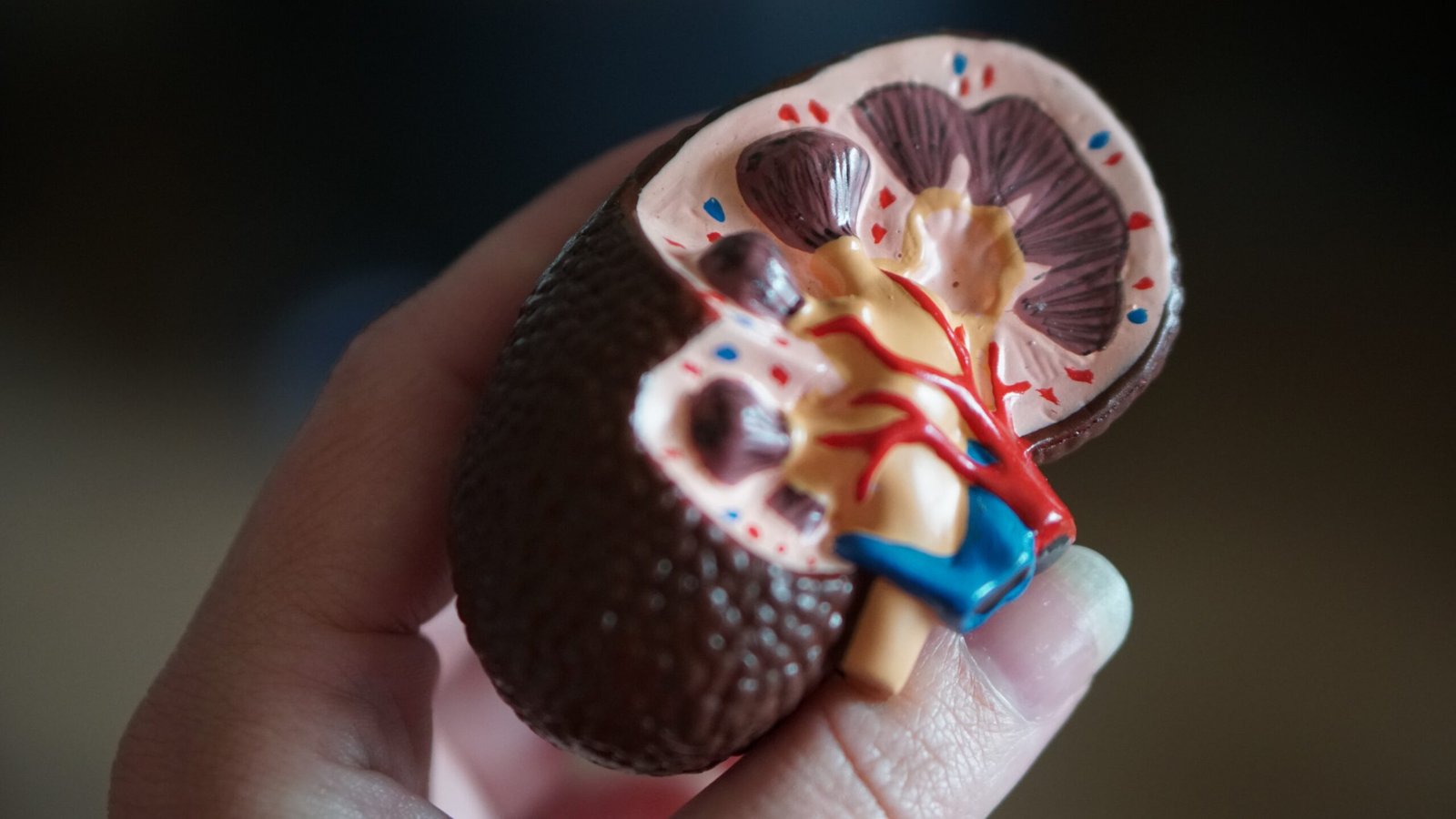Did you know that gout, a type of arthritis characterized by sudden, severe joint pain, might be related to kidney problems? As surprising as it may sound, recent studies have shown a potential link between these two conditions. This article aims to shed light on the connection between gout and kidney problems, providing you with valuable insights on how they interact and impact each other. Understanding this relationship is crucial for individuals facing gout symptoms as it can offer them a better understanding of their overall health and guide them towards appropriate treatment options. So, let's dive deeper into the intricate connection between gout and kidney problems.
Understanding Gout
Gout is a type of arthritis characterized by the sudden and severe inflammation of the joints. It occurs as a result of the buildup of uric acid in the blood, leading to the formation of sharp, needle-like crystals in the joints. These crystals cause intense pain, swelling, redness, and tenderness in the affected area. Gout most commonly affects the big toe, but it can also affect other joints such as the ankles, knees, elbows, and wrists.
Symptoms of Gout
The symptoms of gout typically include sudden and intense joint pain, usually starting during the night. The affected joint becomes swollen, red, and tender to the touch. The pain can be excruciating, making even the slightest movement unbearable. Some people may also experience fever, fatigue, and a general feeling of malaise during an acute gout attack. Gout attacks usually last for a few days to a few weeks, and the frequency and severity of attacks can vary from person to person.
Causes of Gout
Gout occurs when the body produces an excessive amount of uric acid or has difficulty eliminating it. Uric acid is a waste product that is formed when the body breaks down purines, which are substances found in certain foods and drinks, such as red meat, seafood, alcohol, and sugary beverages. Normally, uric acid is dissolved in the blood and excreted through the kidneys in the form of urine. However, when there is an overproduction of uric acid or the kidneys are unable to eliminate it effectively, uric acid levels in the blood can become elevated, leading to the development of gout.
Understanding Kidney Problems
Kidney problems refer to a range of conditions that affect the proper functioning of the kidneys. The kidneys are responsible for filtering waste products and excess fluid from the blood, maintaining electrolyte balance, and producing hormones that regulate blood pressure. When the kidneys are damaged or not functioning properly, waste products and fluid can build up in the body, leading to a variety of health problems.
Common Types of Kidney Problems
There are several common types of kidney problems, including chronic kidney disease (CKD), kidney stones, urinary tract infections, and polycystic kidney disease. CKD is a progressive condition in which the kidneys gradually lose their ability to filter waste products from the blood. Kidney stones are small, hard mineral deposits that form in the kidneys and can cause severe pain when they pass through the urinary tract. Urinary tract infections occur when bacteria enter the urinary tract and multiply, leading to inflammation and infection. Polycystic kidney disease is an inherited disorder characterized by the growth of numerous cysts in the kidneys, which can eventually impair kidney function.
Signs and Symptoms of Kidney Issues
The signs and symptoms of kidney issues can vary depending on the specific condition and the stage of kidney disease. Common symptoms include frequent urination, particularly at night, difficulty or pain when urinating, blood in the urine, foamy or bubbly urine, swelling in the hands, feet, or face, fatigue, loss of appetite, nausea, and muscle cramps. In later stages of kidney disease, symptoms can become more severe, including high blood pressure, anemia, bone disease, and fluid retention.
Link Between Gout and Kidney Problems
The kidneys play a crucial role in the regulation of uric acid levels in the body. They filter uric acid from the bloodstream and excrete it in the urine. When the kidneys are not functioning properly, uric acid can accumulate in the blood, raising the risk of gout. Furthermore, high levels of uric acid can also have detrimental effects on the kidneys themselves, potentially leading to kidney problems.

Role of Kidneys in Uric Acid Regulation
The kidneys play a key role in the regulation of uric acid levels in the body. They filter uric acid from the bloodstream and excrete it in the urine. When the kidneys are functioning optimally, they help maintain a balance between the production and elimination of uric acid. However, when the kidneys are diseased or damaged, they may not be able to excrete uric acid efficiently, resulting in higher levels of uric acid in the blood.
Impact of High Uric Acid Levels on the Kidneys
Elevated levels of uric acid can have detrimental effects on the kidneys. The high concentration of uric acid in the blood can lead to the formation of uric acid crystals in the kidneys, a condition known as urate nephropathy. These crystals can cause inflammation and damage to the renal tubules, the structures responsible for filtering waste products from the blood. Over time, this can impair kidney function and contribute to the development of kidney problems.
Possible Causes of Gout and Kidney Problems
There are several possible causes of gout and kidney problems, including poor diet and lifestyle, genetic predisposition, and certain medical conditions.
Poor Diet and Lifestyle
A poor diet and unhealthy lifestyle choices can contribute to the development of gout and kidney problems. Consuming a diet high in purine-rich foods, such as red meat, seafood, and alcohol, can increase uric acid production and raise the risk of gout. Similarly, a diet high in salt, sugar, and saturated fats can contribute to the development of kidney problems, such as high blood pressure and chronic kidney disease. Sedentary behavior, obesity, and smoking are also lifestyle factors that can increase the risk of both gout and kidney problems.
Genetic Predisposition
Genetics can also play a role in the development of gout and kidney problems. Certain genetic variations can affect the body's ability to process and eliminate uric acid, increasing the risk of gout. Similarly, inherited conditions such as polycystic kidney disease can predispose individuals to kidney problems.
Medical Conditions
Certain medical conditions can increase the risk of both gout and kidney problems. Diabetes, high blood pressure, and metabolic syndrome are examples of conditions that can contribute to the development of both gout and kidney disease. These conditions often involve chronic inflammation and impaired kidney function, which can contribute to the accumulation of uric acid in the blood and the development of kidney problems.
Common Risk Factors for Gout and Kidney Problems
In addition to the causes mentioned above, there are several common risk factors that increase the likelihood of developing gout and kidney problems.

Obesity
Obesity is a significant risk factor for both gout and kidney problems. Excess body weight can lead to increased uric acid production and reduced kidney function, increasing the risk of developing gout and kidney disease. Furthermore, obesity is often associated with other risk factors such as high blood pressure, diabetes, and high cholesterol, which further contribute to the development of gout and kidney problems.
Persistent Dehydration
Dehydration can contribute to the development of gout and kidney problems. When the body is dehydrated, uric acid becomes more concentrated in the blood, increasing the risk of crystal formation and gout attacks. Dehydration can also impair kidney function, reducing the body's ability to eliminate waste products and maintain electrolyte balance.
Long-term Consumption of Alcohol or Certain Medications
Excessive and long-term consumption of alcohol has been associated with an increased risk of both gout and kidney problems. Alcohol consumption can lead to dehydration, increased uric acid production, and reduced kidney function. Similarly, certain medications, such as diuretics and some chemotherapy drugs, can increase uric acid levels in the blood and contribute to the development of gout and kidney problems.
The Biological Mechanism of Gout Leading to Kidney Problems
The biological mechanism of gout leading to kidney problems involves the deposition of urate crystals in the kidneys and the induction of inflammation and kidney damage.
Deposition of Urate Crystals in the Kidneys
When uric acid levels in the blood are elevated, urate crystals can form and accumulate in the kidneys. These crystals can obstruct the flow of urine and cause inflammation and damage to the renal tubules. Over time, the accumulation of urate crystals can impair kidney function and contribute to the development of kidney problems.
Induction of Inflammation and Kidney Damage
The presence of urate crystals in the kidneys triggers an immune response, leading to the activation of inflammatory pathways. This inflammation can further damage the renal tissue and impair kidney function. The chronic inflammation associated with gout and kidney problems can perpetuate a cycle of damage and inflammation, worsening the condition over time.
Effect of Kidney Disease on Gout
Kidney disease can have a significant impact on gout, affecting both the development and management of the condition.

Reduced Excretion of Uric Acid
When the kidneys are not functioning properly, they may not be able to excrete uric acid efficiently. This leads to higher levels of uric acid in the blood, increasing the risk of gout. Additionally, reduced kidney function can impair the elimination of other waste products from the body, further contributing to the development of gout and kidney problems.
Prevalence of Gout Among People with Kidney Disease
Gout is more common among individuals with kidney disease compared to the general population. The accumulation of urate crystals in the kidneys and the impaired kidney function associated with kidney disease create an environment conducive to the development of gout. Moreover, the presence of kidney disease can complicate the management of gout, as certain medications used to treat gout may not be suitable for individuals with impaired kidney function.
Management and Treatment of Gout and Kidney Problems
The management and treatment of gout and kidney problems involve a combination of lifestyle modifications, medications, and, in some cases, surgical interventions.
Lifestyle Modifications
Adopting a healthy diet low in purine-rich foods, reducing alcohol consumption, and increasing fluid intake can help manage gout and prevent the progression of kidney problems. Regular exercise and maintaining a healthy weight are also essential in reducing the risk of both conditions.
Medications for Managing Gout and Kidney Problems
There are several medications available to manage gout and kidney problems. Nonsteroidal anti-inflammatory drugs (NSAIDs) can help alleviate the pain and inflammation associated with gout attacks. Medications such as allopurinol and febuxostat can help lower uric acid levels in the blood, reducing the frequency and severity of gout attacks. In cases of severe kidney damage, medications and treatments focused on preserving renal function may be necessary.
Surgical Interventions If Necessary
In some cases, surgical interventions may be required to manage gout and kidney problems. Surgery may be performed to remove uric acid crystals from the joints or, in severe cases, to remove damaged portions of the kidneys. These interventions are typically reserved for individuals who do not respond to other treatments or have significant kidney damage.
Prevention Strategies for Gout and Kidney Problems
Prevention plays a critical role in reducing the risk of gout and kidney problems. Adopting a few simple strategies can help minimize the chances of developing these conditions.
Adopting a Healthy Diet
Eating a balanced diet that is low in purine-rich foods, sodium, and sugar can help prevent the development of gout and kidney problems. Focus on consuming fresh fruits and vegetables, whole grains, lean proteins, and low-fat dairy products. Limit your intake of red meat, seafood, alcohol, and sugary beverages.
Regular Exercise
Engaging in regular physical activity can help maintain a healthy weight, improve circulation, and support overall kidney function. Aim for at least 150 minutes of moderate-intensity exercise or 75 minutes of vigorous exercise each week. Consult with your healthcare provider to determine the most appropriate exercise routine for you.
Staying Well-Hydrated
Drinking an adequate amount of water and staying well-hydrated is essential for preventing gout and kidney problems. Aim to drink at least 8 glasses (64 ounces) of water per day, and increase your intake if you are physically active or in hot weather. Limit your consumption of sugary and caffeinated beverages, as they can contribute to dehydration.
Regular Medical Check-ups
Regular medical check-ups are crucial for the early detection and management of gout and kidney problems. Maintain an ongoing relationship with your healthcare provider and discuss any concerns or symptoms you may have. They can monitor your kidney function, uric acid levels, and provide guidance on appropriate management strategies.
Research Outlook on Gout and Kidney Problems
Research in the field of gout and kidney problems is ongoing, with a focus on improving understanding, diagnosis, and treatment options for these conditions.
Recent Findings
Recent studies have shed light on the complex relationship between gout and kidney problems. Researchers have identified specific genetic variations associated with an increased risk of both conditions, providing valuable insights into the underlying mechanisms. Additionally, novel medications targeting uric acid metabolism and inflammation pathways are being developed and tested for the management of gout and kidney problems.
Ongoing Research
Ongoing research aims to further explore the links between gout and kidney problems and uncover potential biomarkers for early detection and monitoring of these conditions. Researchers are also investigating the impact of lifestyle modifications, such as dietary interventions and exercise, on the prevention and management of gout and kidney problems.
Future Perspectives
The future holds promise for advancements in the prevention, diagnosis, and treatment of gout and kidney problems. Continued research efforts may lead to the development of personalized treatment strategies tailored to individual patients based on their genetic profile and disease severity. Furthermore, improved understanding of the underlying mechanisms of gout and kidney problems may pave the way for the development of targeted therapies that address the root causes of these conditions.
In conclusion, gout and kidney problems are closely related, with the kidneys playing a crucial role in the regulation of uric acid levels in the body. The deposition of urate crystals in the kidneys and the impact of high uric acid levels can contribute to the development of kidney problems. Likewise, kidney disease can exacerbate the symptoms of gout and complicate its management. Adopting a healthy lifestyle, regular medical check-ups, and ongoing research efforts are essential in preventing and effectively managing both gout and kidney problems.
